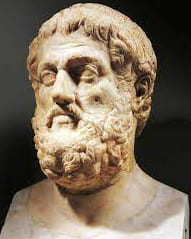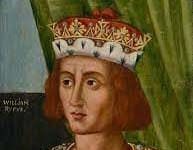Sophocles was one of the most celebrated ancient Greek playwrights and a pioneer of Greek tragedy. Known for his influential works like ‘Oedipus Rex’ and ‘Antigone’, Sophocles explored themes of fate, divine will, and moral dilemmas. His innovations in theatre and character development continue to shape Western literature and drama.
Sophocles | Brief Biography
Sophocles was a Greek playwright and philosopher who lived from 496 BC to 406 BC. He was one of the three great tragedians of classical Athens, along with Aeschylus and Euripides, and is considered one of the greatest playwrights of all time.
Sophocles was born in Colonus Hippius, near Athens, to a wealthy and influential family. He was well-educated and showed an early talent for writing, composing his first play when he was only in his twenties. Over the course of his long career, he wrote more than 120 plays, many of which are still widely performed and studied today.
Sophocles is best known for his contributions to the genre of tragedy. He is said to have introduced several important innovations to the form, including the use of a third actor and the expansion of the chorus. He also wrote some of the most famous works in the tragic canon, including “Oedipus Rex,” “Antigone,” and “Electra.” These plays dealt with weighty themes such as fate, destiny, justice, and human suffering, and are considered some of the finest examples of the genre.
Aside from his writing, Sophocles was also an active participant in the political and cultural life of Athens. He served as a general in the Peloponnesian War, and was said to have been a close friend of Pericles, one of the most influential leaders of classical Athens. He was also involved in the production of dithyrambs, choral hymns to the god Dionysus, and was a member of the city’s cultural and intellectual elite.
In addition to his writing and political activities, Sophocles was also known for his wisdom and philosophical views. He was said to have been a devotee of the Pythagorean philosophy, which emphasized mathematics, ethics, and a mystical approach to the study of the natural world. He was also a firm believer in the concept of fate, and several of his plays deal with the idea of a predetermined destiny that cannot be avoided.
Sophocles lived a long and productive life, dying at the age of 90. He left a lasting legacy, not only as one of the greatest playwrights of all time, but also as a philosopher and thinker whose ideas continue to influence and inspire people today. 0 0 0.
.
Sophocles: Comprehensive Biography
Sophocles was one of the most celebrated playwrights of ancient Greece and a key figure in the development of Greek tragedy. Known for his profound exploration of human nature, fate, and the divine, he introduced innovative theatrical techniques that revolutionized Greek drama. His most famous plays include ‘Oedipus Rex’, ‘Antigone’, and ‘Electra’, all of which have influenced Western literature and philosophy for centuries.
Early Life and Background
Sophocles was born around 497/496 BCE in Colonus, a village near Athens, Greece. He came from a wealthy and influential family, which afforded him a privileged upbringing and education. This exposure to culture and learning helped shape his artistic and intellectual talents from a young age.
As a boy, Sophocles was involved in various cultural activities, including music and athletics. His early participation in public life is said to have included leading a chorus of boys at a victory celebration after the Battle of Salamis in 480 BCE, a significant event during the Greco-Persian Wars.
Contribution to Greek Drama
Sophocles is considered one of the three great tragedians of ancient Greece, along with Aeschylus and Euripides. He significantly altered the structure of Greek drama, which until then was largely dominated by Aeschylus’ innovations. One of his most important contributions was the introduction of a third actor, which allowed for more complex character interactions and plot development. This change greatly influenced the direction of Greek theatre.
Sophocles also reduced the role of the chorus in his plays, making it less central to the action and allowing the dialogue between characters to take precedence. His focus was on individual characters, their internal struggles, and how they related to the larger themes of fate, destiny, and divine intervention.
Famous Works
Sophocles wrote over 120 plays during his lifetime, though only seven have survived in full. His works are known for their complex characters, tragic themes, and exploration of moral and philosophical issues. Some of his most famous plays include:
‘Oedipus Rex’ (Oedipus the King): This is perhaps Sophocles’ most well-known play and is widely regarded as a masterpiece of Greek tragedy. The play tells the story of Oedipus, the king of Thebes, who unknowingly fulfills a prophecy that he would kill his father and marry his mother. ‘Oedipus Rex’ explores themes of fate, free will, and the limits of human knowledge. It is often cited as a prime example of dramatic irony and tragic inevitability.
‘Antigone’: This play is the third part of Sophocles’ Theban Trilogy, though it was written before ‘Oedipus Rex’. It centers on Antigone, the daughter of Oedipus, who defies King Creon’s orders by burying her brother Polynices, who had been declared a traitor. The play examines the conflict between individual conscience and state law, and raises questions about justice, loyalty, and the consequences of absolute power.
‘Electra’: ‘Electra’ is another tragedy that explores themes of revenge, justice, and familial loyalty. It tells the story of Electra and her brother Orestes, who plot to kill their mother, Clytemnestra, to avenge the murder of their father, Agamemnon. The play delves into the emotional and moral complexities of vengeance and the psychological toll it takes on those involved.
‘Ajax’: This early tragedy recounts the fate of the great warrior Ajax during the Trojan War. After being humiliated by the Greek leaders for not being awarded Achilles’ armor, Ajax descends into madness and eventually takes his own life. The play focuses on themes of honor, pride, and the psychological trauma of war.
‘Philoctetes’: This play tells the story of Philoctetes, a Greek hero who is abandoned on a deserted island due to a festering wound. Years later, the Greeks return to seek his help in winning the Trojan War. The play explores themes of suffering, isolation, and the complex nature of heroism and friendship.
Themes in Sophocles’ Plays
Sophocles’ plays often deal with the tension between fate and free will, the role of the gods in human affairs, and the consequences of human error. He was particularly interested in the moral and psychological struggles of his characters and their confrontation with destiny. Some key themes in his works include:
Fate and Destiny: Many of Sophocles’ characters are caught in the grip of fate, unable to escape their preordained destinies. In ‘Oedipus Rex’, for example, Oedipus’ attempts to avoid his fate only lead him closer to its fulfillment, illustrating the inescapable power of prophecy.
Divine Will vs. Human Action: Sophocles often depicted characters whose actions were influenced or controlled by divine forces, yet they still exercised personal choice. This tension between human agency and divine intervention is a central theme in his work.
Moral Dilemmas: Sophocles’ characters are frequently faced with difficult moral decisions, such as Antigone’s choice to obey divine law over human law, or Electra’s quest for revenge against her mother. These dilemmas reflect the complexities of human nature and the consequences of moral choices.
Tragic Heroism: Sophocles’ tragic heroes are often noble figures who fall from grace due to a combination of fate, personal flaws, and circumstances beyond their control. His portrayal of tragic heroes, like Oedipus and Antigone, highlights the vulnerability of even the most powerful individuals.
Influence on Theatre and Philosophy
Sophocles’ innovations in theatre, particularly his focus on character development and moral complexity, had a profound impact on the development of drama. His portrayal of tragic heroes and the moral questions they faced influenced not only later Greek playwrights but also Roman dramatists and modern theatre.
His exploration of human suffering, justice, and the consequences of personal decisions resonated with later philosophers as well. Aristotle, in his work ‘Poetics’, praised Sophocles for his mastery of tragedy, particularly for the way he used plot and character to evoke pity and fear, leading to catharsis in the audience.
Public Life and Achievements
In addition to his work as a playwright, Sophocles was active in public life. He served as a military general alongside Pericles during the Samian War in 441 BCE, demonstrating his involvement in Athenian politics and leadership. He was also appointed to important religious and political roles in Athens, further reflecting the respect he commanded within his society.
Sophocles won numerous awards for his plays at the Dionysia, the major Athenian festival where playwrights competed. He is said to have won first prize 18 times and never placed lower than second, a testament to his enduring popularity and influence during his lifetime.
Later Life and Death
Sophocles continued to write and produce plays well into his later years. According to tradition, his final play, ‘Oedipus at Colonus’, was performed posthumously, around 401 BCE. The play is notable for its serene and philosophical tone, reflecting the aging playwright’s contemplation of death and the afterlife.
Sophocles died around 406 BCE at the age of 90. His long life and prolific career made him a central figure in the golden age of Athens. He was honored as a hero after his death, a recognition of his contributions to literature and culture.
Legacy
Sophocles’ legacy as a playwright and thinker has endured for centuries. His plays continue to be performed and studied worldwide, offering timeless insights into the human condition. His ability to explore complex moral and philosophical issues through compelling characters and dramatic plots has ensured his place as one of the greatest playwrights in history.
Sophocles’ influence extended beyond the realm of theatre. His ideas about fate, morality, and human nature have shaped the fields of literature, philosophy, and psychology. His works remain a cornerstone of classical studies and continue to resonate with modern audiences for their exploration of universal themes.
Conclusion
Sophocles was a pioneering playwright who revolutionized Greek drama and explored profound questions about fate, justice, and human nature. His plays, particularly ‘Oedipus Rex’ and ‘Antigone’, remain essential works in the history of literature and theatre. His legacy as one of the greatest tragedians of all time continues to influence both artistic and intellectual thought to this day. 0 0 0
.
Sophocles: Data in Brief
- Full Name: Sophocles
- Born: Circa 497/496 BCE, Colonus, near Athens, Greece
- Died: Circa 406 BCE, Athens, Greece
- Occupation: Playwright, Dramatist, Politician
- Notable Works: ‘Oedipus Rex’, ‘Antigone’, ‘Electra’, ‘Ajax’
- Innovations: Introduced the third actor, reduced role of the chorus, complex character development
- Themes: Fate, divine intervention, moral dilemmas, human suffering
- Achievements: Won first prize at the Dionysia festival 18 times, served as a general and in public offices in Athens
Sophocles: FAQs
1. Who was Sophocles?
Sophocles was an ancient Greek playwright and one of the greatest tragedians of classical Athens. He wrote over 120 plays, of which only seven have survived in full. He is known for his innovative contributions to Greek drama.
2. What are Sophocles’ most famous works?
His most famous works include ‘Oedipus Rex’, ‘Antigone’, ‘Electra’, and ‘Ajax’. ‘Oedipus Rex’ is regarded as one of the greatest Greek tragedies, exploring themes of fate, free will, and human suffering.
3. What innovations did Sophocles bring to Greek theatre?
Sophocles introduced the third actor to Greek theatre, which allowed for more complex dialogue and character interaction. He also diminished the role of the chorus, shifting the focus to individual characters and their inner struggles.
4. What are the main themes in Sophocles’ plays?
Sophocles often explored themes such as fate, the tension between human will and divine intervention, moral dilemmas, and the consequences of human choices. His characters face intense internal and external conflicts, often in tragic circumstances.
5. What is ‘Oedipus Rex’ about?
‘Oedipus Rex’ tells the story of Oedipus, the king of Thebes, who unknowingly fulfills a prophecy that he would kill his father and marry his mother. The play deals with themes of fate, free will, and the limits of human understanding.
6. How did Sophocles influence later drama and literature?
Sophocles’ innovations in character development, plot structure, and his exploration of moral and philosophical themes had a profound influence on later playwrights, including Euripides and Shakespeare. His works are considered foundational to Western literature and drama.
7. What public roles did Sophocles hold?
Sophocles was not only a playwright but also a public figure in Athens. He served as a military general and held several political and religious offices, reflecting his active participation in Athenian society.
8. How did Sophocles die?
Sophocles died around 406 BCE at the age of 90. His long life allowed him to witness the golden age of Athens and contribute significantly to its cultural and artistic achievements.
9. Why is Sophocles called the “father of tragedy”?
Although Aeschylus is often credited with founding Greek tragedy, Sophocles is considered one of its greatest masters due to his innovations in dramatic structure and character development. His works pushed the boundaries of the genre and set new standards for tragic drama. 0 0 0
N. B. This article originally belongs to the book, ‘Brief Biographies of Ancient Thinkers and Writers‘ by Menonim Menonimus.
Books of Biography by M. Menonimus:
- The World Writers-Brief Biographies
- Introduction to World Writers
- Introduction to World Personalities
- Love of Reputed Persons ..
Additional Searches:
- Famous Writers
- 9 Greek Philosopher
- Ancient Biography
- Ancient Greek Philosophy
- Japanese Philosophy
- Chinese Philosopher
- Ancient Sanskrit Literature and Writers ….











